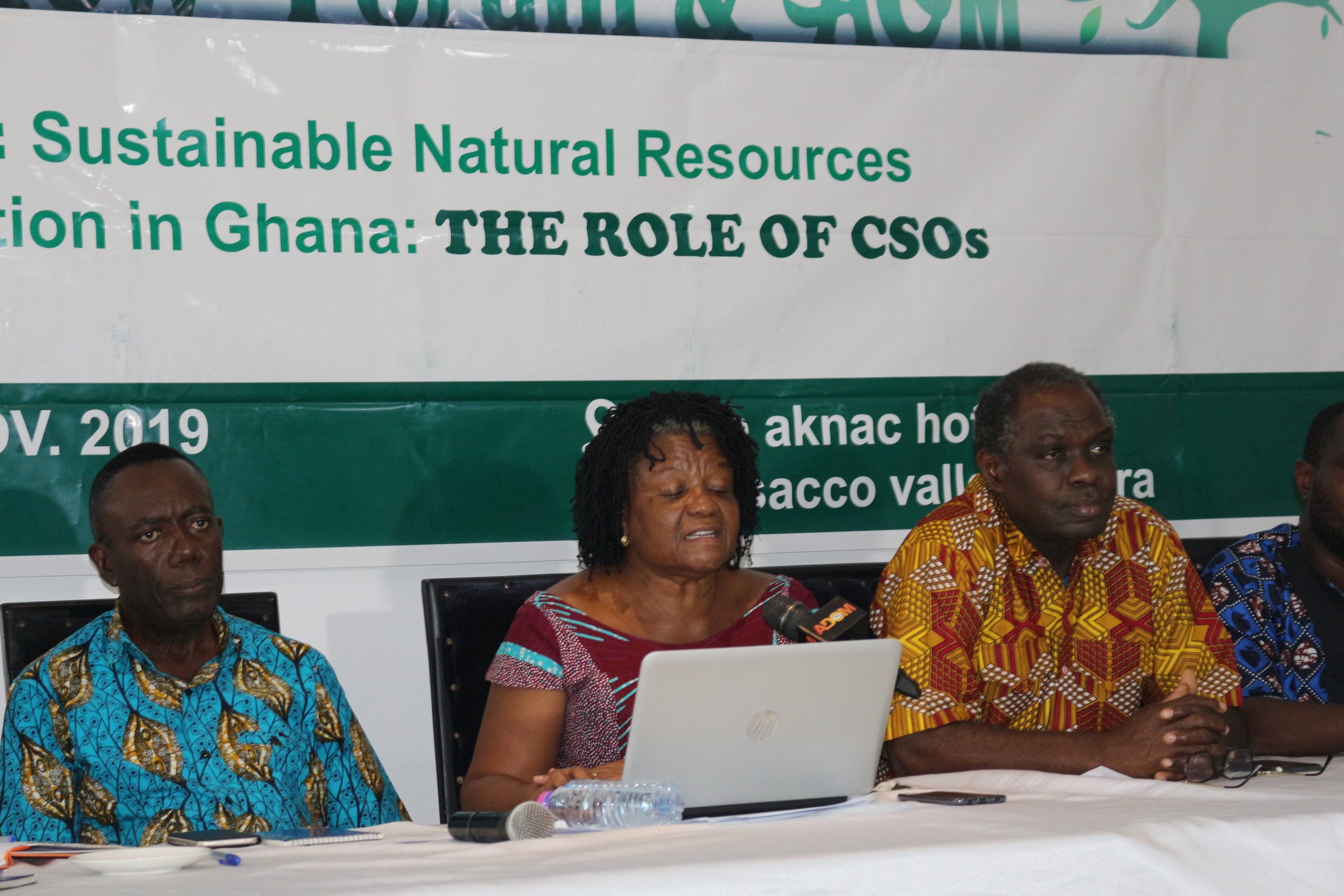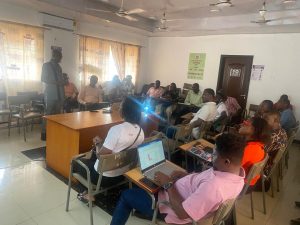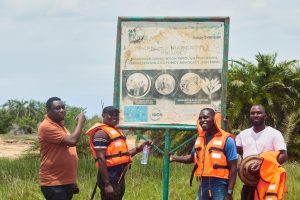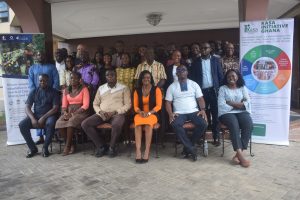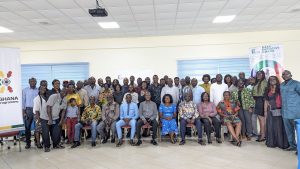PREAMBLE
We members of KASA, an umbrella body of 7 coalitions of natural resources related non-governmental and civil society organisations, having met at our Annual Review/General Meeting (AGM) from 13th to 14th of November, 2019, at Aknac Hotel, Adjiriganor in Accra;
And having considered and discussed some crucial developments and issues within the country’s natural resources sector, namely: fisheries, forestry, mining, land, oil and gas, water and sanitation as well as climate change and environment;
And taking cognizance of cross cutting issues such as the stalling of the Environment and Natural Resources Council (ENRAC), government’s inability to sustain the annual review of the sector for five years now, to find out how the decisions of government is affecting the economic and cultural environment and spiritual well-being of the Ghanaian population, particularly, the poorest;
Hereby resolve as follows:
That his Excellency the President’s call for Ghana beyond aid agenda can only be achieved through good and sustainable NRE governance;
Acknowledging that stewardship of Ghanaian peoples is essential to safeguard Ghana’s remaining natural resources;
Hereby, call on government as a matter of urgency to take pragmatic steps to ensure sustainable exploitation of Ghana’s natural resources by addressing the following under listed concerns:
FISHERIES
- “SAIKO” (illegal transshipment) deprives artisanal fishers and fishing communities of their livelihoods, incomes and food security, whilst the state loses about 50 million US Dollars annually. Government must urgently demonstrate political will by stopping SAIKO through effectively enforcing relevant fisheries laws and regulations.
- We call for a comprehensive stakeholder review of the current Ghana National Marine Fisheries Management Plan 2015-2019 to appreciate its implementation and also provide lessons for the development of a new Fisheries Management Plan in 2020.
- In the 2020 budget, government intends to implement two months fishing closed season. We demand that government adheres to the recommendations of the scientific and technical working group by observing the closed season in July and August during the upwelling when the staple pelagic fishes spawn.
MINING
- Community mining programmes cannot be absolved from miners’ obligations of respecting rights of indigenous and other community people from exercising rights to Free Prior Informed Consent (FPIC), clean environment, safe guarding water and other community resources. To effect such rights, community mining and all other mining operations should not make citizens worse off within their known environment.
- Extractive sector policies on women should be guided by gender disaggregated data, socio-cultural, economic and livelihood choices of women as a prerequisite before mining licenses and leases are granted to companies.
- The right of women and to participate in processes in the extractive sector should be exercised through FPIC.
- Government should take steps to incorporate into the mining laws and regulations, international protocols on mining and environment, such as ECOWAS Mining Directive and ECOWAS Mining Code and adopt international best environmental practices and policies in the mining sector.
FORESTRY
FLEGT-VPA licensing
- We call on Government to as a matter of urgency push forward with the conversion of extant leases by submitting the completed company forms to Parliament for ratification as a last political hurdle towards issuance of FLEGT license.
Legal Reform
- We call for the development of a consolidated Forest and Wildlife laws as well as the fast tracking of the legislation for the CREMAs.
Rosewood
- We call on the Forestry Commission to consider using the Ghana Wood Tracking System, to regulate the logging of rosewood
- There is an urgent need to make public the findings of the Ministerial Committee setup to investigate illegal rosewood harvesting and matters arising as alleged by EIA report, including that of Kalakpa Nature reserve.
Mining in Forest reserve
- We strongly demand the cessation of plans to open up Atewa and Tano-offin Forest Reserves’ for Bauxite mining as well as ceasation of mining in all Forest reserves
LAND
- We welcome the guidelines for the Large Scale Land Acquisitions developed by Lands Commission, as they provide sound basis for acquisition of land for large scale investment in Ghana. However, the guidelines should be strengthened by upgrading them to legislative instrument to regulate land sector investments.
- We note that the 10 years delay in the passage of the Land bill is hampering the collective voice of vulnerable populations, who want to see a comprehensive legal instrument that covers all relevant related issues including gender and social safety clauses to protect the vulnerable populations. We strongly advocate the passage of the bill and urge government to exercise the needed political will to facilitate the process and further ensure the development of other pro-poor legislative instruments.
OIL AND GAS
- The evidence shows that, Carried and Participation Interest (CAPI) gives Ghana the optimum returns in terms of revenues. The government should go beyond the minimum threshold established in the Exploration and Production (E&P) Act, to maximise revenues for the country;
- Going by the Deputy Minister of Energy, in charge of Petroleum that the low level of interest in Ghana’s first bidding round was as a result of poor quality data, we will urge the Ministry to invest a lot more in data to ensure successful future bid rounds;
- While we give the government credit for putting in place a Beneficial Ownership Disclosure (BOD) framework within a very short time, there will be the need to build demand-side capacity to ensure that citizens are able to support government’s fight against corruption, especially in the Extractive Industry (EI) sector;
- While the Voltaian basin may hold some good prospects for Ghana’s search for more hydrocarbons, it also poses the greatest risk of resource-based conflict. So, issues of benefit sharing, environmental impacts, and expectation management ought to be addressed with all seriousness.
WATER AND SANITATION
- We call for a ban on single use plastics in the country and implementation of the Polluter Pay Principle (PPP) to guide industrial waste management.
- We urge the Ministry of Sanitation and Water Resources (MSWR) to tackle sources of fresh water pollution from mining, agro chemicals, deforestation, poor land use practices and poor industrial waste management.
- We call for a review of laws that give uncontrolled access to industries to divert, impound and convey all forms of water sources for industrial use.
- We also demand that Government should enforce laws and regulations on building in water ways.
CLIMATE CHANGE AND ENVIRONMENT
- We recommend the establishment of a convening space under a public-private partnership in order to facilitate the process of identifying investment opportunities related to the implementation of the NDCs for the private sector. We propose KASA to play the role of an honest broker to ensure that what is agreed upon is followed by both parties.
- We also propose the development of specific program of activities through the development of investment cases and packages for private sector participation in financing NDCs.
- Innovative approaches to financing the NDCs and climate change adaptation should be explored. This includes the application of blended finance, matching funding, guarantees and equity. A critical component of this should include a comprehensive risk management and insurance mechanism as security for investments made.
- There should be incentives (both monetary and non-monetary) that private sector can benefit from as part of their business case. This could be in the form of payment for ecosystem services, carbon credits, making claims (non-deforestation, etc.).
CROSS CUTTING ISSUES
We have noted the linkages in the sector, recognising that actions and inactions in one area could trigger serious issues in other areas. Hence, we are demanding the following:
- Government must take immediate steps to address issues of water quality and environmental sanitation as this affects drinking water, fish stocks, food production, etc.
- Government needs to make clear what its priority agenda is for forests; as carbon sinks or mineral deposits for mining.
- We call on government to reactivate the Environment and Natural Resources Council (ENRAC). This is necessary to better coordinate the policy on extraction of natural resources and its impacts on the environment and people is more critical now than ever.
- Natural resources regulatory institutions should be more accountable and transparent
- PIAC has done great work in highlighting the challenges of revenue management in the oil and gas sector and ensuring public accountability. As other countries are trying to learn from this, we call on the expansion of the mandate of PIAC to cover all natural resources extraction.
- Governance of natural resources is fundamental for achieving our development goals. We continue to urge the regulatory institutions namely: FC, EPA, Minerals Commission, GNPA, etc. to continue to encourage citizens’ participation in their activities to promote accountability. As fiduciaries, we urge them to ensure greater transparency and openness in their work.
- We urge Government to review Ghana’s NDC forest component to address broader forest governance issues and encourage the use of indigenous species for forest restoration not exotic species.

